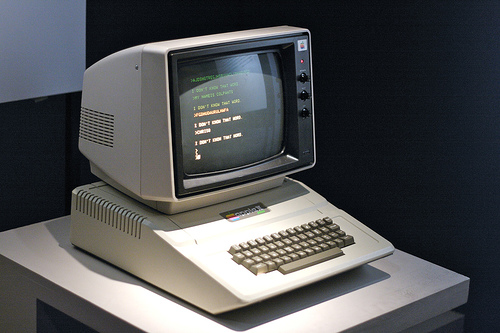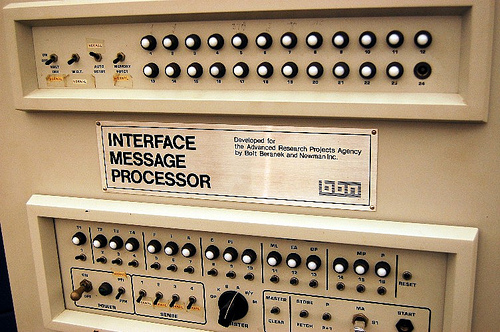Not So New
David Parry / University of Texas at Dallas

“It’s getting late early.” – Yogi Berra1
A few weeks ago while discussing search engines and knowledge organization with my undergrads I made a rather startling discovery. During the framing moments of our conversation, wanting to be able to draw comparisons between different classification systems, I asked the group how many of them had used a card catalog. Then, a strange thing happened. No, it was not the fact that only a handful ever had — this I suspected — but rather that a few asked, “What is a card catalog?” A bit taken aback, I started to explain, to which one student responded, “Oh, I have seen them in old movies.” (Thanks to Ghostbusters my explanation was made a bit easier.) And so here is my concern, in the same way that I argued the issue is not “media,” I want to make the more important claim that what we are talking about here is not “new,” and the continued use of the term “new” is at best less than rigorous, and at worst dangerous.
As the “card catalog” example suggests, there is certainly not anything “new” about using computers to organize information or the ubiquitous Google search box. I have been teaching “digital stuff” for about eight years now and in those eight years I have noted a rather significant shift. While it used to be the case that when we would discuss the internet, social media, and the digital network, students would approach it with a certain lack of familiarity — “What is this strange object before us?” Now they simply take it in stride. There is nothing particularly strange/odd or even noteworthy to many of them about the practice of having a Facebook page. (Indeed this is the second semester in a row where nearly all of my students have a Facebook page.) I used to approach teaching these matters as the question of looking at the strange and contextualizing it in terms of the familiar. I now find that my job is to take the familiar and make it strange, or as Siva Vaidhyanathan observed during an online discussion about this issue, “I use the ‘I’m teaching fish about the ocean’ perspective. I try to make it weird again.”2

I do not mean here to suggest all of that nonsense about digital natives versus non-digital natives; indeed I am actually suggesting something quite the opposite: students are not digital natives who possess some unique set of skills whereby they can magically manipulate the network and gadgets to do whatever they want with outstanding acumen, rather that students are for the large part unreflective about the way they use these network technologies, and what is more are unreflective about the ways in which their use (or our use) has already been historically determined and shaped, an unreflective response which gives up power and control over to these systems.

And so this is my problem with the word, “new.” It suggests that what is happening, the profound shift from a social and cultural structure whose primary form of archivization is analog to one which is digitally networked has not already been significantly shaped by a past. In the first instance as Armand Mattelart convincingly argues, the networking of the world has a longer historical trajectory than simply the last 20 years.3 But secondly, and perhaps more importantly, the social customs, cultural norms, and legal institutions which have come to shape the way that we are using the digital network are not particularly new, and are by the day becoming increasingly more established and codified. Back in the days of Amiga and OS/2 you might have been able to convince me that there was something new going on, but when we are now at the point where three players dominate the Operating System market, with Microsoft owning 90% share, we are no longer at the moment of the new, we are at the moment of the historically established. When Facebook has 350 million plus active users it is no longer a cultural outlier, it is the norm.

The problem with the word “new” is it tends to convey a sense of the different, a recent change, as in, “Do you like my new haircut?” as opposed to the already established and significantly integrated. The internet has been around since the 1960s; there is nothing “new” about it. And, even if one is talking about the internet as widely used and publicly available, the timeline is at least ten years. Now ten years might seem “new” in the world of academia where any literature written after 1900 is considered contemporary, but in the cultural, legal, and social realms, ten years is at least two generations.
Treating the digital network as “new” allows us to ignore it or treat is at less than critical, yet to be determined, or less than urgent, when in fact precisely the opposite is true. These digital networked technologies have so thoroughly penetrated our economic, legal, and social structures that they now form the basis of much of what we do. After the invention of the printing press it took at least a hundred years, much longer in many cases, for the norms of printing press culture to develop (pagination, title pages, copyright laws, reading practices). In this sense the printing press remained a new technology for a long time. The window for negotiating the norms of printing press culture in this respect stayed open quite a while4, but in the case of the digital network that window is much shorter and our unreflexive use of the term “new” carries the unfortunate consequence of deceiving us into believing that we have much more time than we actually do. These “new media” aren’t new; they are central and a fundamental part of our cultural, legal, and social institutions. It is time we started treating them as such.
Image Credits:
1. Card catalog
2. Apple II
3. Arpanet
4. Facebook
Please feel free to comment.
- Although this quote is often attributed to Yogi Berra, what he actually said was, “It gets late early out there.” [↩]
- This was said as part of a discussion on Twitter about the issue of teaching undergraduates. @sivavaid [↩]
- Armand Mattelart, Networking the World, 1794-2000. University of Minnesota Press. 2000. [↩]
- For a thorough examination of this history see Adrian Johns, The Nature of the Book. University of Chicago. 2000. [↩]
Fair enough. So what is/are you alternative(s)? I tend to prefer “digital networked media,” but I’m mindful of Manovich’s fair point about “digital” as not quite right either. (Still, I’m not ready to start using “numerically represented networked media” either.)
Articles like these are why I enjoy reading and participating in Flow. I do think Dr. Parry raises a valuable point in indicting the usage of the word “new” in relation to the Internet. The body of literature that is emerging in the field of mobile networks, broadband and wireless Internet access, and the influx of smart phones, netbooks and tablets certainly indicates that our usage of the technology in this way is a relatively new phenomenon. (I prefer to think of “new media” as “collaborative media,” thereby placing value on usage while lending less favor to the bits and bytes.)
I am one of the “haves;” I’m in a coffee shop on a laptop computer connected to a wireless hotspot, and my Blackberry notifies me about any new message I receive. At the same time as “new” media can be exciting and engaging to an increasing larger audience and a generation of “haves” like me, I wonder whether the “have nots” will understand the impact, the benefits, and the caveats of emerging technology. Thus, I do appreciate Dr. Parry’s suggestion of “making it weird” and bringing technological advancement into perspective within a historical and technological context. The opportunities to capture the minds of the younger generation occur within the elementary and secondary educational systems, and by stripping away the “new” aspect of the technology I believe that educators will be better able to bridge the gap between themselves and the students who look at all of the new technology as shiny, fun toys.
When the dust settles, and when wireless connectivity and ubiquitous computing are not “new” anymore, the decisions being made now in the legal and political systems will have a long and enduring impact on how a new set of students encounter the technology. To that end, I agree that the power of the “new” should not overshadow the significance of the individuals, businesses, groups and cultures that both contribute to and use these technologies.
I am interested in hearing more about the alternatives as Brett suggested. David, thank you for posing an interesting argument in relation to the impact of nomenclature on discussions such as these. I look forward to additional comments!
In a way, I think it is useful to dust off ol’ Baudrillard and think a little bit more closely about “the evil demon of images.” I recall reading Baudrillard with much excitement many years ago, but then I kind of stuck him on my shelf and forgot about him. But lately, when I think about the relationship between programmer/interface/user or that gap between the way things work and the way we use them, Baudrillard seems more important. If you step back from the visual aspects of Baudrillard, and think about representation in more abstract terms, I think his formulation is relevant (1. it is the reflection of a basic reality. 2. it masks and perverts a basic reality. 3. it masks the absence of a basic reality. 4. it bears no relation to any reality whatever: it is its own pure simulacrum.). So much of our “new” world relies upon this basic disconnect between what we have and how we got it. It exists at stage four… history and the future still exist… but the discourse of new media pays no mind, except to say that whatever it is that is being sold at a given moment is “new” and “improved” (and worth every sacrifice).
You are right, David Parry, “new” does not really refer to newness, it simply is an attempt to dodge past debts and future obligations. It refers to a lack of continuity, a general disruption in the chain of causality. New media, like the new economy, is not really new in any strict sense. Rather, these are phenomena that are to be understood as phenomena that exist outside of the long chain of history and progress that we associate with the humanist tradition.
Great article!
This is a good point! It is probably about time we started demanding judges and politicians who use and understand these systems…
Nicely done. I want to share an earlier article I wrote about the same phenomenon, but from a different angle in Flow a few years ago. Here you go . Best.
I read through the piece once, but I really wasn’t sure of the point. Have we adapted to technology quickly? Yes. That is seven words. Why all the other words?
I can’t help but agree with you. I am currently in a Masters of New Media program and when I answer the question: what is that? It just seems easier to explain it as Digital Media rather than New especially to the younger generation.
I think there are some really interesting implicit methodological questions being raised here. How do we “teach” a normalized technology? How do we get students to think critically about the norm? What pedagogical style gets students to stop being “unreflective” and forces them to think about the digital culture we all inhabit? I think defamiliarization is certainly one way to go. I really like the idea that in order to get students engaged, we must defamiliarize the object of study. As a television scholar myself, I bump up against this problem all the time. It is very had to get students to think about television without cable, or to think about serial distribution patterns as being similar to the 19th century novel. But I don’t think the problem resides solely in this use of the word “new.” There is no denying that a card catalogue system is old and digital database systems are new in that one is clearly not in use anymore. Sure they both organize data in a taxonomical way that allows for easy access. But the speed with which the Internet allows us to access information does have a profound social and cultural impact. Just think about how this has effected the fairly innocuous “bar room bet.” What used to be settled days later, can be settled with the flip of one’s phone, therefore rendering knowledge not a product of memory recall but as a product of speed. There is no doubt that the younger students do not think about these implications. But they also are much better at navigating virtual space. Therefore I do believe that these students are “digital natives who possess some unique set of skills whereby they can magically manipulate the network and gadgets to do whatever they want with outstanding acumen.” The way a 15-year-old uses approaches the Internet is vastly different from even a 25 year old. Sure the Web has been around for a while. But the interface is so vastly different. I remember when the Internet had its own yellow pages. I think our goal, as teachers, should be to make these students reflect on what exactly is going on here. Instead of chastising them for being “unreflective about the way they use these network technologies,” we have to show them how the environment they grow up in is both familiar and strange. Technology is always being repurposed in different formats. But I think to deny the newness that technology provides also allows us scholars to sit back and utter the famous BSG lines, “This has all happened before.”
Pingback: This Week in Review: Google’s Buzz buzz, Demand Media’s plans, and turning relationships into revenue » Nieman Journalism Lab
Pingback: This Week in Review: Google’s Buzz buzz, Demand Media’s plans, and turning relationships into revenue | Mark Coddington
I’m a campaigner and definitely not a “native” and what’s interesting is that the more I learn about digital tecnologies is that conventional approaches for on-the-ground campaigning are just as valid in the online space. In that sense, campaigning is campaigning in whatever space you are using, remembering that there may be a need to slightly adjust your tone or message to suit the technology (whether the technology is facebook, TV, print media, or even a old-fashioned human conversation).
I think there are two things that come up when thinking of digital technologies as “new”. First there is a risk that we ignore our past history and cultural norms because we are too dazzled by the “newness” of technologies. But at the same time, if we are frightened by this “newness” we could block experimentation and the potential to shift and grow culture through engagement with digital technologies.
Pingback: Social Media Fasts - academhack - Thoughts on Emerging Media and Higher Education
Pingback: wayneandwax.com » Platform Politricks
Pingback: “so not new” article – Maggie's Page
Pingback: Media Analysis: Mystic Messenger – New Media